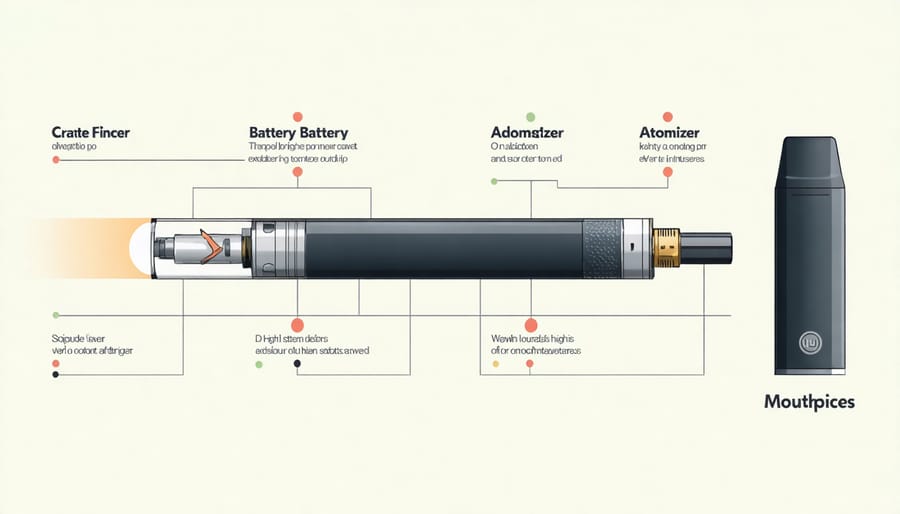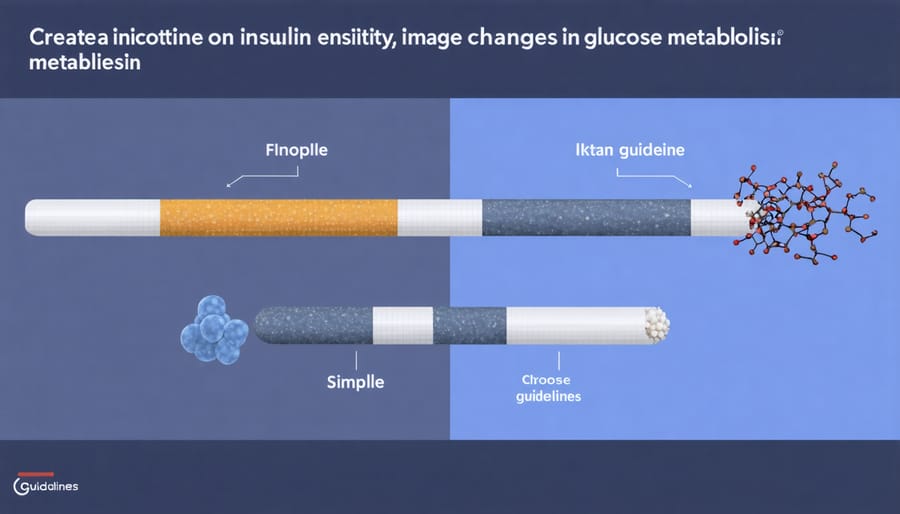Assess your blood glucose levels frequently to understand how vaping influences your diabetes management. Monitor any changes in your blood sugar and adjust your insulin or medication as needed. Stay informed about the potential effects of vaping by visiting reliable sources, such as eurovap terrebonne, to grasp emerging trends and research findings. Consult with healthcare professionals regularly to ensure that vaping doesn’t hinder your diabetes control. Consider personal stories of successfully managing diabetes while vaping to gain insights and motivation from those who balance both.
Understanding Vaping and Diabetes
What is Vaping?
Vaping involves the inhalation of vaporized substances using a device like an e-cigarette. The key components of vaping include the device itself, often called a vape pen, mod, or e-cigarette, and the vape juice or e-liquid, which usually contains a mix of nicotine, flavorings, and other chemicals. While vaping is sometimes marketed as a safer alternative to smoking, it’s important to understand its impact, especially for individuals managing diabetes.
Vaping has gained significant popularity among adults, with many turning to it to reduce or quit traditional smoking. However, its rapid rise in use also sparked discussions around health implications, particularly for those with pre-existing conditions like diabetes. Research is ongoing, but it’s essential for individuals with diabetes and their caregivers to stay informed about how vaping might influence their condition. Balancing diabetes management with lifestyle choices can be challenging, so understanding the components and prevalence of vaping can help in making educated decisions for better health outcomes.

Diabetes Overview
Diabetes is a chronic condition that affects how the body processes blood sugar, or glucose. In type 1 diabetes, the immune system mistakenly attacks and destroys insulin-producing cells in the pancreas. This type of diabetes is generally diagnosed in children and young adults, though it can appear at any age. Common symptoms include increased thirst, frequent urination, hunger, fatigue, and blurred vision. Management typically involves regular blood sugar monitoring, insulin therapy, and lifestyle adjustments such as diet and exercise.
Type 2 diabetes is the more prevalent form, often developing in adults over 45, though it’s becoming increasingly common in younger people due to lifestyle factors. It occurs when the body becomes resistant to insulin or doesn’t produce enough. Symptoms are similar to type 1 and management strategies emphasize healthy eating, physical activity, and maintaining a healthy weight. Medications or insulin therapy may also be necessary.
Understanding these two types and their management is crucial for those affected, especially when considering lifestyle choices like vaping, which can impact blood sugar control and overall health. For practical advice on managing your blood sugar through dietary habits, check out how to manage your blood sugar by changing your eating habits.
Impact of Vaping on Diabetes Physiology
Nicotine and Insulin Sensitivity
Nicotine, a prevalent component in many vaping products, plays a significant role in affecting insulin sensitivity, which is a vital factor in managing diabetes effectively. For individuals with diabetes, maintaining optimal insulin sensitivity is crucial for managing blood glucose levels. Nicotine can potentially disrupt this balance. Research indicates that nicotine may decrease insulin sensitivity, making it more challenging for the body to utilize insulin and effectively manage blood sugar levels. This can lead to higher blood glucose levels, increasing the risk of complications for those with diabetes.
Moreover, nicotine can impact glucose metabolism by influencing how glucose is processed and stored in the body. This interference can further complicate diabetes management, as it may require adjustments in medication or insulin dosages under the guidance of healthcare professionals. It’s important to understand that while vaping is often perceived as a less harmful alternative to smoking, the presence of nicotine still poses challenges for diabetes management.
Personal stories from individuals successfully managing diabetes despite nicotine exposure highlight the importance of a comprehensive diabetes management plan. Consulting with healthcare providers about the impacts of nicotine and exploring smoking cessation options can be empowering steps to bolster insulin sensitivity and promote overall health. Understanding these potential effects equips individuals and caregivers with better strategies to navigate the challenges of diabetes management.

Vaping-Induced Stress Responses
Vaping has emerged as a popular alternative to traditional smoking, yet it may trigger various stress responses in the body, potentially impacting diabetes management. This stress response is partly due to nicotine, a stimulant found in many e-cigarettes, which activates the adrenal glands, releasing adrenaline. Adrenaline may increase heart rate and blood pressure, which can create a state of heightened alertness or stress. For individuals with diabetes, this response might also lead to elevated blood sugar levels, as stress hormones like adrenaline and cortisol prompt the liver to release more glucose into the bloodstream. Understanding the basics about insulin can help manage these blood sugar fluctuations effectively.
In addition to nicotine’s effects, the act of vaping itself can be a psychological stressor for some people. Concerns about health, dependency, and social perceptions can contribute to mental stress, potentially exacerbating blood sugar volatility. It is crucial for individuals with diabetes and their caregivers to monitor these variables closely and consult healthcare professionals to tailor a comprehensive management plan. While more research is needed to fully understand the long-term effects of vaping on diabetes, being aware of these stress responses allows individuals to make informed decisions about their lifestyle choices.
Psychological and Behavioral Aspects
Vaping Addiction and Diabetes Management
Vaping can quickly lead to addiction due to nicotine’s highly addictive nature, which may present additional challenges for individuals managing diabetes. When nicotine addiction takes hold, blood sugar levels can be affected, potentially leading to increased stress and difficulty in managing insulin levels. For those adapting to technological solutions in diabetes management, like the use of an insulin pump, consistency is key. Vaping can introduce unpredictability in blood glucose fluctuations, making it harder to maintain the balance needed for effective management.
Furthermore, the psychological dependency on vaping may distract from the diligent monitoring and lifestyle adaptations crucial for diabetes care. Overcoming vaping addiction requires building strong support networks involving healthcare professionals and loved ones to ensure a holistic approach toward health and well-being. By focusing on proven diabetes management strategies and leveraging available resources, individuals can successfully navigate the path towards improved overall health while minimizing the impact of vaping on their condition.
Lifestyle Changes and Vaping
Vaping is often seen as an alternative to smoking, but its impact on diabetes management deserves careful consideration. Vaping can sometimes influence lifestyle choices, leading to changes in diet and exercise habits, which are pivotal in managing diabetes. Some individuals might find that they snack more frequently after vaping, potentially leading to challenges in balancing blood sugar levels. To effectively manage your blood sugar, incorporating a balanced diet and regular exercise can be significant. Staying active and making mindful food choices help maintain a healthy lifestyle conducive to better diabetes management. Community support and personal stories of success can also provide motivation and insight into how others have navigated these changes. Embracing technology, such as fitness trackers and apps, can assist in monitoring lifestyle habits and keeping track of progress. Ultimately, it’s crucial to remain committed to a plan that prioritizes your health and works for your individual needs, while seeking guidance from healthcare professionals as necessary.
Current Research and Expert Opinions
Recent Studies
Recent studies examining the impact of vaping on diabetes management have shed light on some critical findings for individuals trying to maintain stable blood sugar levels. Researchers have discovered that certain chemicals found in e-cigarette vapor may affect insulin sensitivity, potentially complicating glucose management. One study indicated an association between vaping and increased oxidative stress, which could pose challenges in managing diabetes-related complications, though further research is needed to fully understand these implications. Moreover, while some individuals report vaping as a helpful tool in reducing traditional smoking, the long-term effects on diabetes management remain under scrutiny. These findings underscore the importance of consulting with healthcare professionals when considering vaping, especially for those with diabetes. As studies continue, it’s crucial for individuals to weigh the potential risks and benefits, stay informed, and personalize their diabetes management approach in consultation with their healthcare team. Personal success stories have shown diverse experiences, emphasizing the need for tailored strategies in managing both vaping habits and blood sugar levels effectively.
Expert Opinions
Healthcare professionals and researchers have shared their insights on how vaping affects diabetes management. Many experts emphasize that while vaping is often perceived as a safer alternative to smoking, its impact on blood sugar control and overall health in diabetes patients is still not well understood. Dr. Jane Simmons, an endocrinologist, points out that nicotine can lead to insulin resistance, potentially complicating blood glucose management for those with diabetes. Additionally, Dr. Mark Lander, a diabetes researcher, notes that the flavors and chemicals used in e-cigarettes may also play a role in inflammation and oxidative stress, which are concerning for diabetes care.
On a positive note, some ex-smokers with diabetes report that switching to vaping has helped them maintain steadier blood sugar levels compared to when they smoked. However, experts such as Dr. Sarah Nguyen advise caution, highlighting the need for more research to fully understand vaping’s long-term effects. It is encouraged to consult with healthcare providers when considering vaping as a part of diabetes management strategies, ensuring any decision aligns with a comprehensive care plan.

Personal Stories and Success Cases
Navigating diabetes management while maintaining a vaping habit can be challenging, but many have found ways to balance both successfully. Take Sarah, diagnosed with type 2 diabetes, who managed her condition while incorporating vaping responsibly. By focusing on lifestyle changes and guidance from healthcare providers, Sarah shared how vaping became a tool to reduce her smoking habits, ultimately helping her lose weight with diabetes and improve her overall health. Another inspiring story comes from James, a type 1 diabetic, who addressed his vaping concerns with transparency and engaged in consistent monitoring of his blood sugar levels. His proactive approach was essential in maintaining stable glucose levels while integrating vaping into his lifestyle. These stories emphasize the importance of individualized strategies and professional advice in achieving diabetes management goals, offering hope and encouragement to others striving to understand and manage the impacts of vaping on their health.
Practical Advice for Diabetes and Vaping
Healthy Decision-Making Tips
To make healthier lifestyle choices while managing diabetes and considering vaping, it’s key to prioritize routines that support blood sugar control and overall wellness. Firstly, discuss any vaping habits with your healthcare provider to understand potential impacts on your diabetes management plan. Consider substituting vaping with healthier stress-relief activities, like yoga or meditation, to enhance mental well-being. Stay informed by reviewing trustworthy resources and personal success stories that demonstrate positive lifestyle changes. Regular check-ups and using the latest diabetes technology can help keep your health in check. Always choose strategies that encourage balance and ongoing self-care.
Alternatives to Vaping
Managing diabetes can be challenging, and adding vaping to the mix might complicate things further. Fortunately, there are healthier alternatives that can promote better diabetes management. Deep breathing exercises and meditation are great options; they help reduce stress and improve overall mental well-being, which can positively affect blood sugar levels. Engaging in regular physical activities like walking, swimming, or yoga not only boosts cardiovascular health but also aids in managing glucose levels more effectively. Exploring hobbies such as painting, gardening, or playing musical instruments can also divert attention and serve as satisfying replacements for vaping.
For those looking to maintain a social aspect similar to vaping, joining community groups or clubs focused on health, fitness, or other interests can provide a sense of belonging and motivation. Personal success stories highlight that replacing vaping with healthier habits can significantly enhance both physical health and diabetes management, leading to a more balanced lifestyle.
Conclusion
In conclusion, vaping’s impact on diabetes management is multifaceted, involving both potential risks and areas that require further research. While some individuals with diabetes have successfully transitioned to vaping as a means to quit smoking, it’s crucial to understand that vaping is not without its challenges. The effects on blood sugar levels and overall health, particularly the cardiovascular system, highlight the need for ongoing vigilance. It’s essential for individuals with diabetes, their caregivers, and healthcare providers to be well-informed when considering vaping as part of a broader diabetes management plan. Personal experiences and emerging research indicate that while vaping may be a less harmful alternative for smokers, it should not be seen as a risk-free option. Making informed decisions is key. Those considering vaping should consult with healthcare professionals and continuously monitor their health. With a supportive and informed approach, individuals with diabetes can make choices that best align with their health goals and needs.




